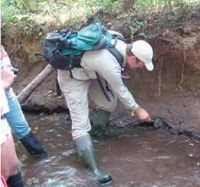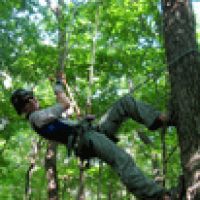Investigating the earth’s critical zone
30 Jan 2012
News Source: CSA News Magazine
To the ordinary eye, south-central Pennsylvania's Shale Hills catchment is a pleasant little tract of deciduous forest much like any other in the northeastern United States. Second-growth oaks and maples splash dappled shade across the 20-acre site, birds flit and call, and water babbles in a narrow, unnamed stream — the first leg on a long jour- ney to the Susquehanna River.
But Pennsylvania State University geologist and SSSA member Susan Brantley is no ordinary observer; for her, the pretty scene evokes a host of questions about why the landscape looks the way it does. She’s now delving into the answers more deeply than ever before. As a co-principal investigator of the Susquehanna Shale Hills Critical Zone Observatory (CZO), Brantley is among a growing cadre of scientists who investigate the earth’s “critical zone”: the living, evolving, outer skin of our planet where rock, soil, water, air, and organisms interact to regulate the environment that is critical to life.
News Source:
READ MORE from CSA News Magazine >>
People Involved
CZO
-
National, Eel, Luquillo, Shale Hills, INVESTIGATOR, COLLABORATOR
-
Shale Hills, INVESTIGATOR
-
National, NATIONAL SCIENCE FOUNDATION
-
Christina, INVESTIGATOR
Explore Further








